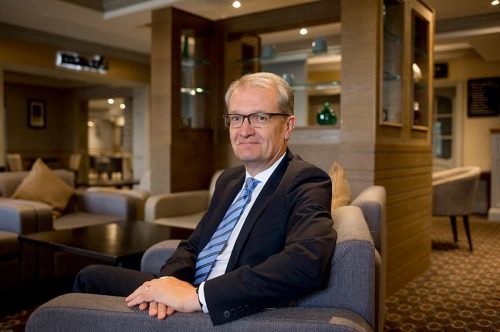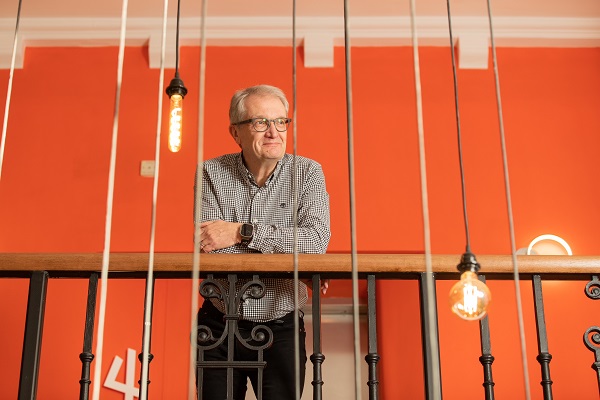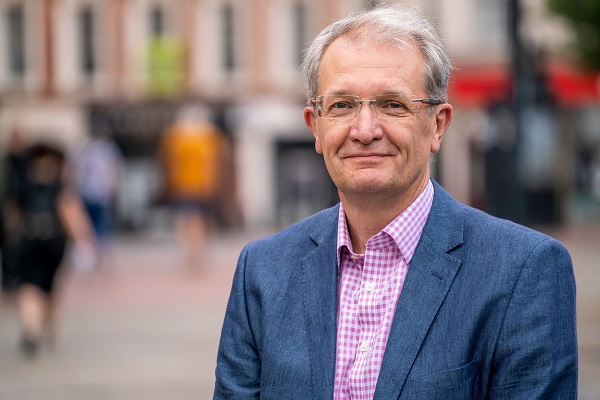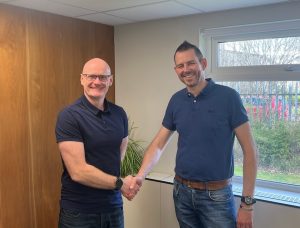Chief in the chair: David Williams – ‘I’m not terribly good at saying no’

If there’s been an important moment to push forward the East Midlands’ case for investment over thelast two decades, it’s a fair bet that David Williams would’ve been involved.
During that time, he’s been (and still is, in some cases) a director at Derby Cityscap, a board member at Derby College, chair at the Derby Nottingham Metro Growth Board, director at Derby County FC, director at Nottingham Regeneration, deputy lieutenant for Derbyshire, a board member at Nottigham Trent University, non-exec director at East Midlands Chamber, deputy chair at the D2N2 LEP, chairman at EMB Group and law firm Geldards, and, latterly, chair of the Business Advisory Board at the East Midlands Combined County Authority (EMCCA).
He’s not one to sit still.
For Williams, becoming chair of the EMCCA wasn’t something he chased. It was, in his words, “a natural thing.” As deputy chair of the Local Enterprise Partnership (LEP), he found himself deeply involved in the conversations that surrounded the early formation of the mayoral combined authority.

David Williams
“There was a general understanding,” he says, “that although we were moving toward a more democratic model, the voice of business still mattered. We didn’t want to lose all the good things the LEP had brought.”
That pragmatic mindset ultimately led to him being asked to chair the Business Advisory Board. “I’m not terribly good at saying no,” he admits with a smile. But there was more to it than a polite acceptance. He saw the role as an opportunity to provide continuity, bringing in people with LEP experience to offer trusted guidance to the newly established authority. With a professional presence in both Nottingham and Derby, he was well-placed to bridge geographic and institutional divides.
“It’s not about benefiting business specifically,” he insists. “It’s about benefiting the region.”
The job was initially understood to be short-term – no strings attached, no hard feelings when the baton needed to be passed. But a year in, it still feels right. “It’s grown naturally,” he says. “And we’re making real progress.”
That progress, though, hasn’t always come quickly. “I’m very impatient by nature,” Williams admits. “From the outside, it may look like things are taking forever. But when you’re creating something from scratch, the timescales always feel longer than you want them to.”
He’s quick to point out that EMCCA is managing a £385 m public budget—no small sum. “You can’t manage public money without the right people and structures in place. That takes time.”
The early months of the authority’s life were always going to be about laying foundations, not making grand announcements. “In a perfect world, Claire [Ward, the Mayor of the East Midlands] would have hit the ground running from day one,” he says. “But that would’ve been irresponsible. You need a strategy first – not a mindset of ‘we’ve got money, let’s spend it.’”
Williams is full of praise for the four upper-tier council leaders involved. “They’ve been brilliant,” he says. “They’ve kept the ship sailing in the same direction, even though they come from very different political and geographic backgrounds. That’s no small achievement.”
Still, within the business community, the reaction to EMCCA has been, as he puts it, “muted at best.” He believes part of the reason is timing. “If we’d had a mayor ten years ago, it might have felt exciting and new. Now, people are more sceptical. But we have to persuade them that devolution is the right thing.”
The political consensus helps. “Both major parties agree that this is the route forward,” Williams says. “This is the only game in town. Business has to back it and support it.”
But he acknowledges that business leaders want to see results before buying in. “Until they can see tangible outputs, it’s hard for them to understand what’s in it for them. That will come. We just need to be patient. Once we’re through the spending review, there’s a significant investment plan waiting. That’s when momentum will build.”
Outside of his regional leadership role, Williams is also a key figure at law firm Geldards, where he has seen first-hand the changing dynamics of the legal sector. Recent years have seen a wave of mergers and acquisitions, but for Geldards, the path forward is more considered.
“We watch the activity with fascination,” he says. “But we’re not jumping into anything. If it isn’t broken, why fix it?”

David Williams
That’s not to say the firm is resistant to change. “We’re open to options,” he explains. “But any decision has to satisfy all the different components of our business. There’s no point in finding a solution that works for one part of the firm but not the others. I’m not convinced that bigger is always better.”
He’s also keenly aware of how the expectations of younger legal professionals have shifted in recent years. “COVID forced change on all of us,” he says. “Some of that change has been good, some not so good. But it made us more open.”
A firm-wide consultation revealed that people valued their colleagues above all else. That insight shaped the firm’s approach to hybrid working and a deliberate transformation of the office environment. “It doesn’t look like a corporate law firm anymore – it looks more like a Starbucks. That’s intentional. Culture matters.”
Environmental, social, and governance (ESG) values, community engagement, and workplace flexibility are now priorities for young lawyers. “They have a much longer list of priorities than I did. I worked 24 hours a day and abandoned family life – that wouldn’t be acceptable now, and I think that’s a positive shift.”
Despite the changes, Willliams feels optimistic. “I don’t see any less hunger or talent coming through universities. If anything, I’m encouraged.”
As he looks to the future, he’s beginning to prepare for life after Geldards. “In a couple of years, I’ll be stepping away. I’m not a workaholic, but I do enjoy being with people. Still – there’s only so much golf you can play.”
When asked about legacy, Williams’ answer is quietly powerful. “I’d like to leave behind a really good firm. Decent people working with decent clients. A human firm. That would mean something to me.”








